Curated OER
Probability Lesson Plan
Your learners will examine probability through experiments and dice games. Using a computer, your class will perform simple experiments to collect and analyze data to determine the probability of different experimental results. Students...
Curated OER
Probability & Game Theory
Learners explore the concept of probability. In this probability lesson, students perform various probability experiments including flipping a coin, picking m&m's out of a bag, and the birthday problem.
Shodor Education Foundation
Introduction to the Concept of Probability
Acquaint mathematicians to the concept of probability with a discussion about the results of a game. Then have them play a dice, card, spinner, or coin game and recording the number of wins vs. the number of tries on an interactive web...
Curated OER
Remote Possibilities
Students collect data and analyze the data using a graph. In this statistics lesson, students use combinations and theoretical and experimental probability to analyze their data. They observe a remote controlled robot as they collect data.
Curated OER
Fair Games
Fifth graders examine the statistics of playing games. Many games of chance and activities in maths text books involve rolling two dice and combining the scores, usually by addition. Students often find the probabilities of such events...
Curated OER
Seeing Is Believing
Students investigate the concepts of probability. They use data to find the central tendency, median, and mode. Students design and play a game in order to practice the concepts. They also complete a table with data that is analyzed.
Curated OER
Data and Probability- What's the Chance?
Young scholars investigate probability through a game. In this data lesson, students use dice and predictions to explore how probability works.
Curated OER
The Monty Hall Problem
Students define and differentiate between experimental and theoretical probability. In this statistic lesson, students play the game "Monty Hall" and use probability to come up with the best strategies to play the game.
Curated OER
Probability
Fifth graders explore simple probability. Using a specified website, they play a "Fish Tank" game where they determine the chances of selecting a red fish from an aquarium. Students answer probability problems and convert fractions to...
Curated OER
Theoretically Speaking
Students define probability. They determine outcome from a given situation based on simple probability. Students create experimental data using a coin and a number cube. They write how theoretical and experimental probability are different.
Curated OER
Let's Take a Chance!
Students investigate probability and the chance of an even happening. In this algebra lesson, students incorporate their knowledge of probability to solve problems and relate it to the real world. They learn to make decisions based on data.
Curated OER
Probability of a Boy
Students investigate the concept of even change by participating in a coin flip activity. They research using the Internet to investigate the chance of giving birth to a boy.
Curated OER
Treats in a Basket
Students explore probability by participating in an experimental activity. In this number statistics lesson, students collaborate in groups in which they move a game piece around a board. Students calculate their probability of landing...
Curated OER
The Colored Cube Question
Fourth graders examine how to determine the probabilities or likelihood of outcomes. They complete trials to determine probability while using different manipulatives. They determine how games can be made fair or unfair in this unit of...
Curated OER
"The Giver" by Lois Lowry
Students predict results, design a model, and carry out trials to determine probability based on their experimentation.
Curated OER
The Historiography on Robert Boyle: Was Boyle the Progenitor of Modern Science?
Young scholars participate in a warm-up activity by attending a football match writing an account of who won the game. They discuss how their account could differ from someone else's account of the game. They discuss how different...
Curated OER
Grade 5: Alphabet Frequency
Fifth graders collect and organize data from writing samples, use fractions and decimals to describe the experimental data, and use the experimental results to make predictions about the frequency of letter usage in the English language.
Curated OER
Make the Highest Total
Sixth graders predict the outcome of a simple probability experiment, test it and explain the result by using problem solving strategies to explore situations mathematically. They then play a few games informally where students play in...
Curated OER
Spinning Nickels
Students make predictions to figure out the probability of a spun nickel landing on either heads or tails. They test their predictions through experimentation. They create a graph showing the frequency for the number of heads.
Curated OER
Coin Shake-Up
Students discuss problem and take turns in pairs, one tossing the coins while the other guesses whether the coins land with the same side up or different sides up. They record the results of each guess as same or different.
Shodor Education Foundation
Shodor Interactivate: Lesson: Intro to the Concept of Probability
The Shodor Education Foundation provides this lesson plan to introduce middle schoolers to the concepts of probability. Students learn about the definition of, outcomes in, and calculations of experimental probability. Middle schoolers...
Other
The Actuarial Foundation: Are You Game? [Pdf]
Games are designed to help students understand and apply concepts of probability. determine fairness.
Shodor Education Foundation
Shodor Interactivate: From Probability to Combinatorics and Number Theory
Apply division to determine the probability of outcomes with a racing game.






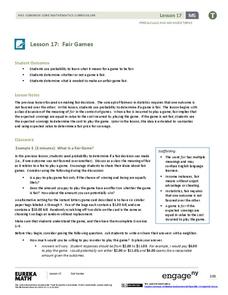


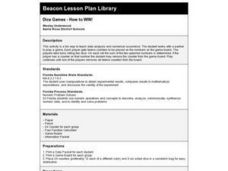


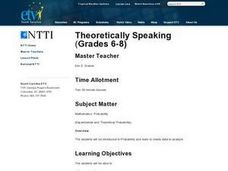





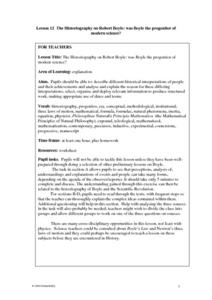




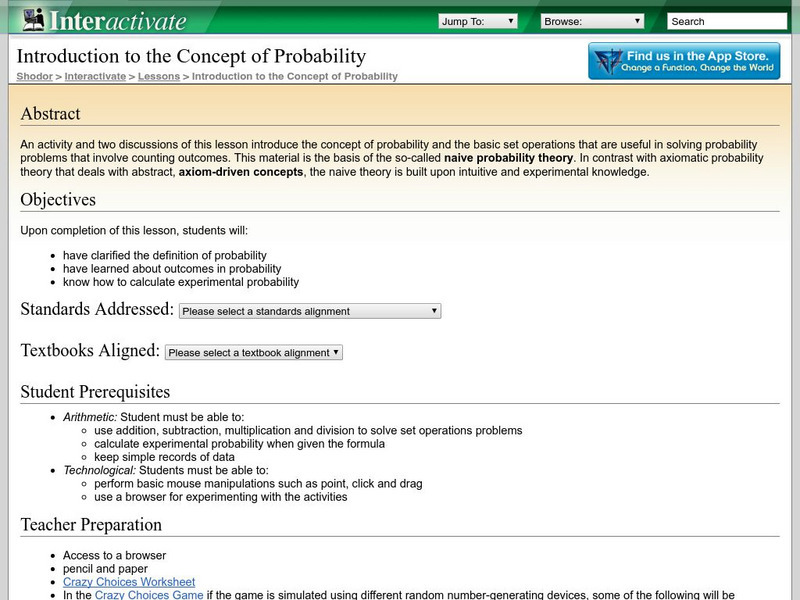
![The Actuarial Foundation: Are You Game? [Pdf] Lesson Plan The Actuarial Foundation: Are You Game? [Pdf] Lesson Plan](https://d15y2dacu3jp90.cloudfront.net/images/attachment_defaults/resource/large/FPO-knovation.png)
